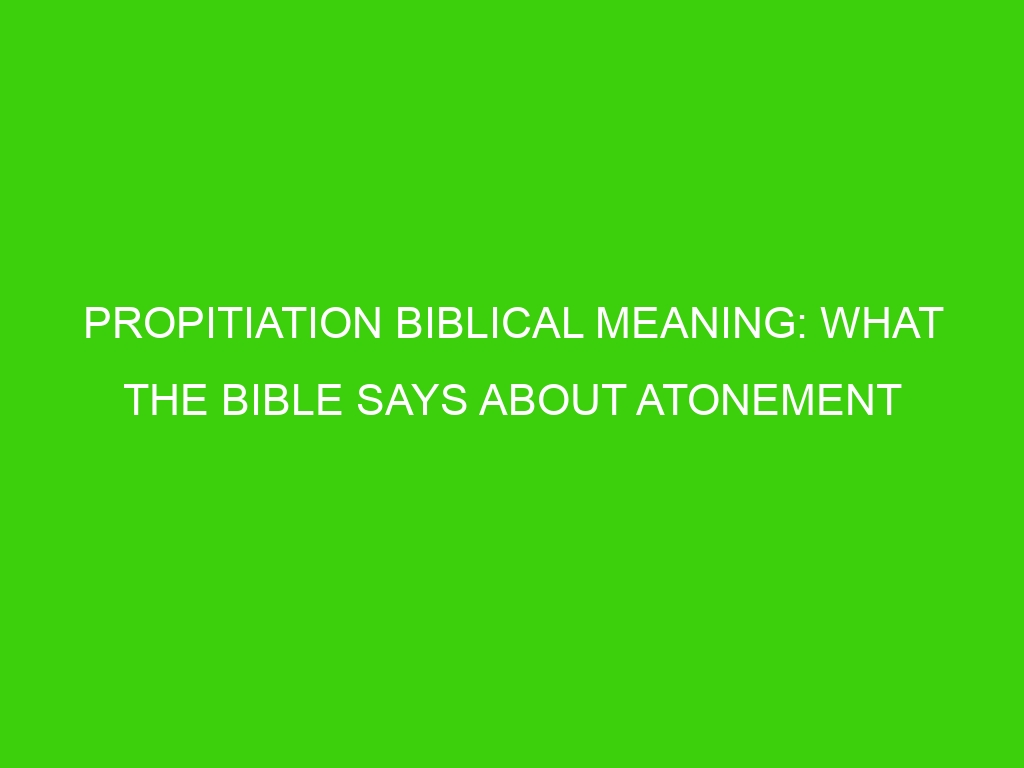Have you ever wondered what the Bible says about atonement and propitiation? If so, you’ve come to the right place! In this article, we’ll explore the propitiation biblical meaning and take a deep dive into this important theological concept.
Strap yourself in as we unpack Scripture to understand what the Bible teaches about propitiation and how it relates to God’s mercy and grace.
You’ll gain insight into how Christ’s sacrifice serves as the atoning sacrifice that allows God to forgive sins without compromising His justice.
We’ll break down big words like expiation and substitution as we seek to understand Christ’s work on the cross at a deeper level.
Whether you’re a theology buff or are just starting to explore biblical concepts, you’ll find this overview of the propitiation biblical meaning enlightening and empowering.
Let’s dive in!
Understanding Propitiation in the Bible
In the Bible, propitiation refers to the act of appeasing God’s wrath and restoring His favor.
It’s how God made a way for our sins to be forgiven through the sacrifice of Jesus.
God’s Righteous Anger
God’s holiness demands that sin and evil be punished.
When we sin, we invoke God’s righteous anger and deserve His punishment.
But because God loves us, He provided a way for His anger to be appeased and for us to be reconciled to Him.
Christ’s Atoning Sacrifice
Jesus’s death on the cross served as the atoning sacrifice for our sins.
By dying in our place, Jesus absorbed the wrath of God that we deserved.
This act of propitiation appeased God’s anger and allowed Him to show us grace, mercy and forgiveness.
Restored Relationship
Through Jesus’s sacrifice, our relationship with God is restored.
No longer under His wrath, but rather under His grace.
Propitiation mends the separation between God and man wrought by sin.
We can approach God with confidence and call Him Father.
The concept of propitiation is a sobering reminder of the holiness of God and the depth of our sin.
But it’s also a source of joy and comfort, for through it God has opened the door of salvation and made a way for us to dwell in His mercy and grace.
Our sins are wiped away, and we are called children of God.
Old Testament Background on Propitiation
The concept of propitiation originates in the Old Testament.
From the very beginning, God provided a way for sin to be covered and for His wrath to be appeased.
When Adam and Eve sinned in the Garden of Eden, God made garments of skin to clothe them, requiring the death of animals.
This shedding of blood covered their sin and allowed them to have a right relationship with God again.
The same idea is seen in the sacrificial system God gave to Israel.
By offering the blood of unblemished animals, the Israelites received forgiveness and atonement for their sins.
God’s holiness demands that sin be dealt with, either by punishment or atonement.
The animal sacrifices provided a temporary covering, but they were imperfect and had to be repeated.
They pointed forward to a perfect sacrifice that would come in the future.
The Old Testament also speaks of God’s wrath against sin and the need for that wrath to be “appeased” or “propitiated.
” Images of God pouring out His anger and fury on those who sin against Him are sobering.
However, the prophets also spoke of a future day when God’s anger would be turned away from His people.
For example, Isaiah wrote, “Therefore, by the blood of your covenant I have sent your prisoners out of the waterless pit.
.
.
.
Because the wrath is past, and Your anger has turned away.” This turning away of God’s wrath is what is meant by propitiation.
The Old Testament clearly shows that without the shedding of blood, there is no forgiveness or appeasement of God’s wrath.
The whole sacrificial system pointed to the need for a perfect sacrifice that would truly take away sins once for all.
This is fulfilled in the person and work of Jesus Christ.
New Testament Teachings on Propitiation
The New Testament expands on the concept of propitiation found in the Old Testament.
The apostle Paul, in particular, articulates the theological meaning and significance of propitiation.
Jesus as the Propitiation for Our Sins
According to Paul, Jesus’ death on the cross served as the ultimate sacrifice for sins and appeased God’s wrath.
Paul writes that God presented Jesus “as a propitiation by his blood, to be received by faith” (Romans 3:25).
The writer of Hebrews echoes this, saying that Jesus “made purification for sins” and now “sat down at the right hand of the Majesty on high” (Hebrews 1:3).
Propitiation Reconciles Us to God
Through propitiation, God’s righteous anger against sin is appeased, and we are reconciled to Him.
Paul writes that “while we were enemies we were reconciled to God by the death of his Son” (Romans 5:10).
We who were once alienated from God because of sin are now reconciled and at peace with Him through the cross.
God’s Wrath Has Been Satisfied
God’s holiness demands that sin be punished.
On the cross, Jesus bore the wrath of God for our sins so that God’s wrath would be satisfied.
The book of Hebrews says “it is a fearful thing to fall into the hands of the living God” (Hebrews 10:31).
But for those who trust in Christ, God’s wrath has already been poured out on Jesus.
We Have Peace with God
As a result of propitiation, we can have peace with God.
Paul writes, “Therefore, since we have been justified by faith, we have peace with God through our Lord Jesus Christ” (Romans 5:1).
Through Jesus taking our place on the cross, the barrier between God and man has been removed, and we can enter into a relationship of peace and fellowship with God.
The New Testament teaches that Jesus’ sacrificial death on the cross accomplished propitiation – averting God’s wrath by atoning for sin and reconciling us to God.
By trusting in Christ’s work, we can experience peace with God.
Jesus as the Propitiation for Our Sins
As Christians, we know that Jesus died on the cross to atone for our sins.
But what exactly does that mean? The Bible tells us that Jesus is the “propitiation” for our sins.
This simply means that Jesus satisfied God’s wrath against sin by taking our punishment upon himself.
Jesus Bore God’s Wrath
In the Old Testament, God’s wrath against sin had to be “propitiated” or satisfied through the blood of sacrifices.
Jesus is the ultimate sacrifice that satisfies God’s wrath once and for all.
On the cross, Jesus bore the full cup of God’s wrath so that we don’t have to.
All of God’s righteous anger against sin was poured out on Jesus.
Jesus Paid Our Debt
Another way to think about propitiation is that Jesus paid a debt we could never pay.
We owed a sin debt that we could never repay, but Jesus paid it in full with his blood.
Our sin left us bankrupt before God, but Jesus redeemed us with his precious blood.
The cross was the ultimate act of love – Jesus sacrificing himself to rescue us from sin and death.
We Are Reconciled to God
The result of propitiation is reconciliation.
Through Jesus, we are reconciled to God.
We were once enemies of God because of our sin, but now we have peace with God through our Lord Jesus Christ.
Propitiation removes the barrier between us and God and brings us into a right relationship with him.
We can now come boldly into God’s presence, clothed in the righteousness of Christ.
Propitiation is at the very heart of the gospel.
We could never satisfy God’s wrath against sin on our own.
But in his mercy, God sent his Son to be the propitiation for our sins.
Jesus bore the wrath of God so that we can be reconciled and at peace with God.
This is the incredibly good news of the gospel!
Applying the Doctrine of Propitiation to Our Lives Today
Love Others Unconditionally
The ultimate act of propitiation was God sending His Son Jesus to die for our sins so we could be reconciled to Him.
We should follow Christ’s example and love others unconditionally, even when they hurt us.
Make an effort to forgive those who wrong you and be kind to people who are unkind in return.
It’s not easy, but it’s what Jesus calls us to do.
Serve in Humility
Jesus came to serve, not be served.
We should adopt an attitude of humility and see ourselves as servants to others.
Look for opportunities each day to help someone in need.
It could be as simple as mowing your neighbor’s lawn, bringing a meal to a sick friend, or volunteering your time for a good cause.
When we serve with a humble spirit, it honors the One who gave His all for us.
Share the Good News
The message of propitiation—that Jesus died to restore our relationship with God—is the best news anyone could receive.
As followers of Christ, we are called to share this news with others through our words and actions.
Look for natural ways to start spiritual conversations, invite someone to church, offer to pray for others, and live in such a way that people see Jesus in you.
There are hurting souls all around us that long to be reconciled to God.
What an honor to play even a small role in sharing the message of propitiation.
The doctrine of propitiation reminds us of the depth of God’s love and the sacrifice of His Son.
As we apply the truths of propitiation to our daily lives through unconditional love, humble service, and sharing the Gospel message, we bring glory to God and draw closer to Him.
Our lives become a living testimony to the power of the cross and a beacon of hope for a lost world longing to be made right with God.
Conclusion
So there you have it, folks.
At its core, propitiation is about restoring your relationship with God.
Jesus’ sacrifice on the cross turned away God’s wrath so you could receive mercy and forgiveness instead.
God loves you so much that He provided a way through Jesus for your sins to be covered, and for you two to be reconciled.
Propitiation might sound formal or heady, but it’s actually an incredibly personal truth.
Because of what Jesus did, you can approach God boldly and receive His love.
You don’t have to earn it or be perfect.
His grace is freely offered to you.
So walk in that truth today and live in the freedom of being fully known and fully loved by your Creator.



